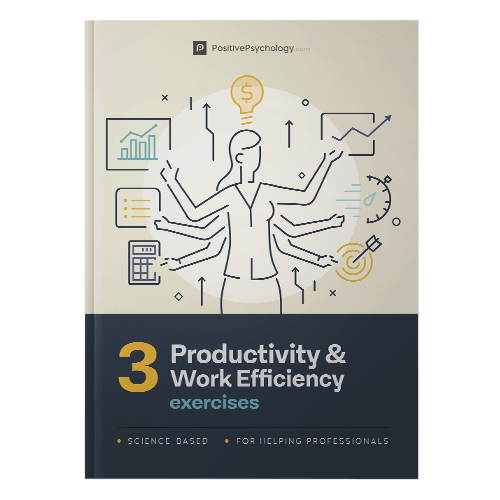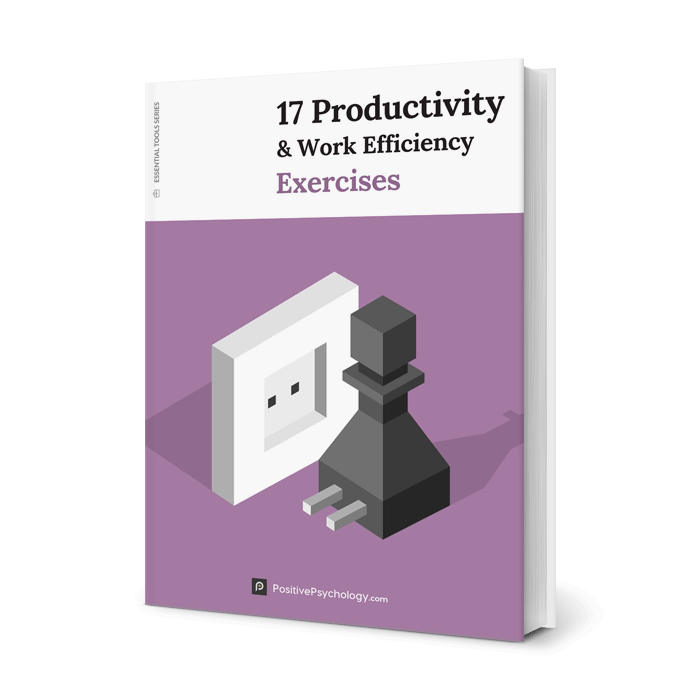How to Improve Cognitive Function: 6 Exercises & Tests
 Cognitive health is increasingly recognized as a key component of overall health and wellness (Bart et al., 2018).
Cognitive health is increasingly recognized as a key component of overall health and wellness (Bart et al., 2018).
As with other dimensions of health and wellness, deliberate effort is needed to maintain and especially improve cognitive health.
In this article, we discuss key factors and exercises that can improve cognitive function and help sustain cognitive health across the lifespan.
Before you continue, we thought you might like to download our three Productivity Exercises for free. These detailed, science-based exercises will help you or your clients become more productive and efficient.
This Article Contains:
- Strengths-Based Approach to Cognitive Health
- How to Improve Cognitive Function 101
- Enhancing Cognitive Health: 6 Exercises & Games
- How to Maintain Cognitive Fitness in Older Age
- Testing Cognitive Fitness: 5 Health Assessments
- Can Supplements Help Maintain Cognitive Health?
- Helpful PositivePsychology.com Resources
- A Take-Home Message
- References
Strengths-Based Approach to Cognitive Health
For much of their history, psychiatry, clinical psychology, and related disciplines like counseling focused on treating our deficits, rather than developing our strengths.
This focus on deficits began to shift dramatically with the advent of positive psychology.
With the positive psychology movement in the late 1990s came a focus on finding and developing an individual’s strengths and using these to overcome any deficits (Diener, 2009).
In the realm of cognition, this entailed finding areas of thinking, memory, and problem solving that were relative strengths for an individual.
For example, you might find that abilities such as sustained attention and organization are among your most notable cognitive strengths. You might also note the presence of external factors supporting your cognition, such as a healthy diet, regular exercise, and good sleep habits.
In taking careful inventory of your cognitive strengths, you are in the best position to enhance and deploy them, improving your cognitive health and function.
How to Improve Cognitive Function 101

Researchers at Harvard Medical School have cited six key factors in maintaining a healthy body/brain (adapted from Harvard Health Publishing, 2021):
- A plant-based diet rich in fruits, vegetables, and grains
- Regular exercise
- Good sleep habits
- Stress reduction
- Social involvement
- Challenging your brain
The Harvard researchers emphasize the importance of cultivating these factors together, as they reinforce each other and lead to optimal brain and cognitive health.
The first four factors – concerning diet, exercise, sleep, and stress reduction – can be seen as indirect support for cognitive health. Together, they represent the “healthy mind in a healthy body” principle.
The last two factors, social interaction and challenging the brain, involve cognition more directly.
Social interaction stimulates and challenges the brain in ways that solitary activities cannot. It draws on multiple skills, such as visual-spatial processing of faces and gestures, inferring others’ motivations, decision making about how to behave within social norms, etc.
Individuals with broader and more complex social networks seem to have larger or more developed amygdala and related brain structures (Bickart, Wright, Dautoff, Dickerson, & Barrett, 2011).
The amygdala and related structures are deep brain areas crucial for regulating emotions and facilitating memory storage. This and similar studies suggest a strong association between social interaction and brain health in these crucial areas.
Maintaining or expanding your social network can, therefore, help ensure overall brain and cognitive health.
Challenging the brain with specific activities is the second, more direct means toward cognitive health, such as with the following cognitive exercises and games.
Enhancing Cognitive Health: 6 Exercises & Games
There are various high-tech cognitive exercises available through paid programs such as Lumosity. Such programs offer digitally based brain exercises for most ages and ability levels.
However, there are also relatively low-tech, low-cost, effective options for cognitive strengthening, available to most individuals with some ingenuity and effort. Harvard Medical School has outlined several of these (Godman, 2021), including the following:
- Learn a new language
This can help with mental agility and be neuro-protective, since a new language forges new connections among neurons, making them more resistant to disease (Kroll, Dussias, Bice, & Perrotti, 2015). - Listen to or make music
Music activates multiple brain areas, including those that process emotions, memory, and movement (Wan & Schlaug, 2010). There are many free online sites for listening to and learning to play music. - Cards, board games, and electronic games
Card games are a cheap and fun way to exercise memory and strategy skills. Board games like Trivial Pursuit build memory for facts, while games like Monopoly exercise math, financial, and strategy skills. Strategy and 3D adventure video games have been shown to have significant benefits for attention, short-term memory, and reaction time (Brilliant T, Nouchi, & Kawashima, 2019). - Travel
Whether to near or far destinations, travel exposes us to new sights, sounds, and experiences that build new connections between neurons, including the so-called “place cells” in the brain’s memory circuits (Eichenbaum, Dudchenko, Wood, Shapiro, & Tanila, 1999). - Cultural consumption
Take in films, plays, poetry readings, museum tours, etc. The newer and more unusual these are for you (for example, seeing a foreign film, visiting a new museum, or reading a poet you haven’t read before), the more challenging and stimulating they will be for your brain and the more new connections you will establish between neurons (Park & Huang, 2010). Culture can wire and rewire the brain, a process that continues throughout our lives. - Puzzles
Puzzles are meant to challenge the brain. They also draw on the brain’s natural tendencies to perceive patterns, complete sequences, and solve problems (Fissler et al., 2018).
How to Maintain Cognitive Fitness in Older Age

Just as with any other population, it is crucial to find a challenge for older adults that is “just right” so that the individual’s abilities are stimulated but not overwhelmed (Proffitt, 2016).
For example, a verbal memory task for an older person with encroaching memory problems might be modified to include a 6-item list of words to recall, instead of a 12-item list. Prompts and cues can spur memory and provide the individual with an experience of success.
If a cognitive task is too easy, it will not serve to strengthen a person’s abilities. If it is too hard, you risk overwhelming the person. This is especially true of people with encroaching Alzheimer’s disease, the most common dementing condition in the elderly (Desai & Grossberg, 2001).
Finding the right cognitive challenge for such individuals allows them to exercise their faculties and experience some success, rather than becoming overwhelmed and frustrated.
6 Effective ways to improve cognitive ability
Testing Cognitive Fitness: 5 Health Assessments
Neuropsychological testing is one way to assess cognitive health. However, this option can be costly and labor intensive. In many cases, basic screening will suffice for an understanding of a given individual’s cognitive health status (Wasserman, Anderson, & Schwartz, 2016).
There are a number of excellent tools available to practitioners for basic screening and tracking of cognitive health. Many of these tools are designed for use with older people, but some are meant for use with younger people as well.
The Alzheimer’s Association website offers a cognitive assessment toolkit that includes the Medicare Annual Wellness Visit algorithm for the assessment of cognition. This assessment uses patient history, observations by clinicians, and concerns raised by the patient, family, or caregivers.
The toolkit further includes three measures validated for use by professionals to assess and track a patient’s cognitive health. These measures include the General Practitioner Assessment of Cognition, Memory Impairment Screen, and the Mini-Cog brief psychometric test.
Each of the above measures has the following advantages (Alzheimer’s Association, n.d.):
- Can be given in five minutes or less
- Equal or superior to the popular Mini-Mental State Exam for detecting dementia
- Easily administered by non-physician health practitioners
- Relatively free from educational, language, and cultural bias
For younger individuals, the Montreal Assessment of Cognition is a widely used instrument that has been validated for cognitive screening in people between 14 and 21 years old (Pike, Poulsen, & Woo, 2017).
Other basic screenings have been used to assess cognitive function in youth with conditions such as epilepsy (Asato, Doss, & Plioplys, 2015) and brain injury (Rasquin et al., 2011).
In designing a cognitive health screening for any age group, it’s important to keep the following considerations in mind (adapted from Wasserman et al., 2016):
- What level of training or expertise is required for the professionals giving the screening measure? A good screening should be one that can be administered with a minimum of training.
- How often will the screening be used? At what time intervals?
- Can the screening be billed to insurance?
- What supplies – paper forms, computer programs, etc. – are needed to do the screening?
- How will the screening results be communicated to examinees?
- What decisions, if any, will be based on screening results? These might include referrals for more in-depth testing or cognitive enhancement or rehabilitation exercises.
Can Supplements Help Maintain Cognitive Health?

These supplements include B-complex and E vitamins, minerals such as zinc, herbs such as ginkgo biloba, and other botanicals.
Such supplements are commonly used among all age groups, especially in developed countries (Gestuvo & Hung, 2012).
Evidence for the efficacy of supplements in maintaining cognitive health has been mixed.
The Ginkgo Evaluation of Memory study followed 3,069 older adult participants over the course of six years, randomly assigned to ginkgo biloba or placebo groups (DeKosky et al., 2008). The study found no evidence that the supplement slowed cognitive decline or prevented dementia.
Further, some researchers have warned that ginkgo biloba’s blood-thinning properties might interact negatively with anticoagulant medication and produce excess bleeding (Qato et al., 2008).
B-complex vitamins such as B6, B9, and B12 have not been shown to prevent or slow cognitive decline in older adults (McMahon et al., 2006).
Studies have shown that certain supplements such as zinc can have positive effects on frontal or executive function in children and adults (Warthon-Medina et al., 2015).
Recently, a large prospective cohort study followed 5,395 participants for 9.6 years and found that those with the highest intake of vitamin-E-rich foods were 25% less likely to develop dementia than the third of the group with the lowest vitamin E intake (Devore et al., 2010).
As always, it is best to consult your physician before taking either approved medications or medical supplements.
Helpful PositivePsychology.com Resources
We have a number of resources that specifically apply to strength assessments and a healthy mind. For some practical resources to get you started, check out some of the following.
Exercise and Mental Health
This handout is a valuable resource you can use to educate children about the benefits of exercise for mental wellness.
In particular, it lists several of the emotional and neurochemical benefits of exercise and recommends several forms of exercise children might enjoy. Use it to facilitate discussion about the link between mind and body when talking about the brain and cognitive health.
The Strengths Wheel
This exercise invites clients to illustrate the gap between the extent to which they are currently using their strengths and the extent to which they could. This exercise effectively gives clients immediate visual feedback on their strength use and can facilitate discussion around plans to increase or optimize strengths use.
You can access this tool, together with the Bull’s-Eye Values Survey and Compassionate Chair Work exercises by downloading our free Positive Psychology Exercises pack.
Cognitive Fitness Survey
This measure was created with the help of the Activity Builder at Quenza.com. Quenza is a platform created by the same team who established PositivePsychology.com and is an online tool to revolutionize practitioners’ work with clients.
The Cognitive Fitness Survey can be used for self-reflection. It is designed to assess and track physical and emotional factors that contribute to cognitive health. It also assesses and tracks specific cognitive health dimensions, including attention; short-term, remote, and prospective memory; and organizational capacity.
To access the tool, we recommend a trial account for $1 for 30 days.
17 Productivity & Work Efficiency Exercises
If you’re looking for more science-based ways to help others become more productive and efficient, this collection contains 17 validated productivity and work efficiency exercises. Use them to help others prioritize better, eliminate time wasters, maximize their personal energy, and more.
A Take-Home Message
For much of their history, clinical psychology and related helping professions focused on assessing and treating emotional, social, and cognitive deficits.
With the positive psychology movement in the late 1990s came a different emphasis: finding and building upon strengths.
Aspects of health and wellbeing began to be studied more assiduously and became the focus of interventions. Initially, cognitive health was one aspect of overall health and wellbeing that was overlooked by many researchers and practitioners.
Fortunately, more recently, cognitive health has begun to receive the attention it deserves, as both a research topic and focus of intervention (Aidman, 2020).
As with other components of health and wellness, cognitive health, including attentional capacity, memory abilities, and organizational and problem-solving skills, can be enhanced with the right support and exercises.
Staying physically healthy pays large dividends toward such cognitive fitness. Physical health includes maintaining a heart-healthy diet, sleeping well, and exercising regularly.
In addition, basic, cost-effective mental activities and exercises can further boost cognitive fitness. Many of these are enjoyable in their own right and can boost cognitive skills. These include listening to or making music; doing puzzles; playing card, board, or video games; cultural consumption such as seeing films and reading novels; and nature walks for forest bathing (Wen, Yan, Pan, Gu, & Liu, 2019).
To be most effective, cognitive activities and exercises should involve as much novelty as possible. This will ensure that maximum nerve growth or neuroplasticity takes place, in response to new stimuli (Park & Huang, 2010).
It is also important that cognitive activities and exercises provide “just-right challenges” for the individual involved – neither too easy nor too difficult.
To find the right activities, a positive psychology, strengths-based approach might be useful. Such an approach builds awareness of our strengths and encourages their use in overcoming obstacles and reaching goals – the “just-right challenges.”
We hope you enjoyed reading this article. Don’t forget to download our three Productivity Exercises for free.
- Aidman, E. (2020). Cognitive fitness framework: Towards assessing, training and augmenting individual-difference factors underpinning high-performance cognition. Frontiers in Human Neuroscience, 13.
- Alzheimer’s Association. (n.d.). Cognitive assessment. Retrieved July 27, 2021, from https://www.alz.org/professionals/health-systems-clinicians/cognitive-assessment
- Asato, M. R., Doss, J. L., & Plioplys, S. (2015). Clinic-friendly screening for cognitive and mental health problems in school-aged youth with epilepsy. Epilepsy & Behavior, 48, 97–102.
- Bart, R., Ishak, W. W., Ganjian, S., Jaffer, K. Y., Abdelmesseh, M., Hanna, S., … Danovitch, I. (2018). The assessment and measurement of wellness in the clinical medical setting: A systematic review. Innovations in Clinical Neuroscience, 15(9–10), 14–23.
- Bickart, K. C., Wright, C. I., Dautoff, R. J., Dickerson, B. C., & Barrett, L. F. (2011). Amygdala volume and social network size in humans. Nature Neuroscience, 14(2), 163–164.
- Brilliant T, D., Nouchi, R., & Kawashima, R. (2019). Does video gaming have impacts on the brain: Evidence from a systematic review. Brain Sciences, 9(10), 251.
- Desai, A. K., & Grossberg, G. T. (2001). Recognition and management of behavioral disturbances in dementia. Primary Care Companion to the Journal of Clinical Psychiatry, 3(3), 93–109.
- Diener, E. (2009). Positive psychology: Past, present, and future. In S. J. Lopez & C. R. Snyder (Eds.), Oxford handbook of positive psychology (pp. 7–11). Oxford University Press.
- DeKosky, S. T., Williamson, J. D., Fitzpatrick, A. L., Kronmal, R. A., Ives, D. G., Saxton, J. A., … Furberg, C. D. (2008). Ginkgo biloba for prevention of dementia: A randomized controlled trial. Journal of the American Medical Association, 300(19), 2253–2262.
- Devore, E. E., Grodstein, F., van Rooij, F. J., Hofman, A., Stampfer, M. J., Witteman, J. C., & Breteler, M. M. (2010). Dietary antioxidants and long-term risk of dementia. Archives of Neurology, 67(7), 819–825.
- Eichenbaum, H., Dudchenko, P., Wood, E., Shapiro, M., & Tanila, H. (1999). The hippocampus, memory, and place cells: Is it spatial memory or a memory space? Neuron, 23(2), 209–226.
- Fissler, P., Küster, O. C., Laptinskaya, D., Loy, L. S., von Arnim, C., & Kolassa, I. T. (2018). Jigsaw puzzling taps multiple cognitive abilities and is a potential protective factor for cognitive aging. Frontiers in Aging Neuroscience, 10, 299.
- Gestuvo, M., & Hung, W. (2012). Common dietary supplements for cognitive health. Aging Health, 8(1), 89–97.
- Godman, H. (2021, March 29). Simple, low-cost, low-tech brain training. Harvard Health Blog. Retrieved July 19, 2021, from https://www.health.harvard.edu/blog/low-cost-low-tech-brain-training-2021032922247
- Harvard Health Publishing. (2021, February 15). Six steps to cognitive health. Retrieved July 19, 2021, from https://www.health.harvard.edu/mind-and-mood/six-steps-to-cognitive-health
- Kroll, J. F., Dussias, P. E., Bice, K., & Perrotti, L. (2015). Bilingualism, mind, and brain. Annual Review of Linguistics, 1, 377–394.
- McMahon, J. A., Green, T. J., Skeaff, C. M., Knight, R. G., Mann, J. I., & Williams, S. M. (2006). A controlled trial of homocysteine lowering and cognitive performance. New England Journal of Medicine, 354(26), 2764–2772.
- Park, D. C., & Huang, C. M. (2010). Culture wires the brain: A cognitive neuroscience perspective. Perspectives on Psychological Science, 5(4), 391–400.
- Pike, N. A., Poulsen, M. K., & Woo, M. A. (2017). Validity of the Montreal Cognitive Assessment Screener in adolescents and young adults with and without congenital heart disease. Nursing Research, 66(3), 222–230.
- Proffitt, R. (2016). Gamification in rehabilitation: Finding the “just-right-challenge”. In D. Novák, B. Tulu, & H. Brendryen (Eds.), Handbook of research on holistic perspectives in gamification for clinical practice (pp. 132–157). IGI Global.
- Qato, D. M., Alexander, G. C., Conti, R. M., Johnson, M., Schumm, P., & Lindau, S. T. (2008). Use of prescription and over-the-counter medications and dietary supplements among older adults in the United States. Journal of the American Medical Association, 300(24), 2867–2878
- Rasquin, S., van Heugten, C., Winkens, I., Ritzen, W., Hendriksen, J., & Vles, H. (2011). Development and validity of the Brain Injury Alert (BI Alert) screening tool for cognitive, emotional and social problems after pediatric acquired brain injury. Brain Injury, 25(7–8), 777–786.
- Wan, C. Y., & Schlaug, G. (2010). Music making as a tool for promoting brain plasticity across the life span. The Neuroscientist, 16(5), 566–577.
- Warthon-Medina, M., Moran, V. H., Stammers, A. L., Dillon, S., Qualter, P., Nissensohn, M., … Lowe, N. M. (2015). Zinc intake, status and indices of cognitive function in adults and children: A systematic review and meta-analysis. European Journal of Clinical Nutrition, 69(6), 649–661.
- Wasserman, R. M., Anderson, B. J., & Schwartz, D. D. (2016). Screening of neurocognitive and executive functioning in children, adolescents, and young adults with type 1 diabetes. Diabetes Spectrum, 29(4), 202–210.
- Wen, Y., Yan, Q., Pan, Y., Gu, X., & Liu, Y. (2019). Medical empirical research on forest bathing (Shinrin-yoku): A systematic review. Environmental Health and Preventive Medicine, 24(1).
Read other articles by their category
- Body & Brain (49)
- Coaching & Application (57)
- Compassion (26)
- Counseling (51)
- Emotional Intelligence (24)
- Gratitude (18)
- Grief & Bereavement (21)
- Happiness & SWB (40)
- Meaning & Values (26)
- Meditation (20)
- Mindfulness (45)
- Motivation & Goals (45)
- Optimism & Mindset (34)
- Positive CBT (28)
- Positive Communication (20)
- Positive Education (47)
- Positive Emotions (32)
- Positive Leadership (18)
- Positive Parenting (4)
- Positive Psychology (33)
- Positive Workplace (37)
- Productivity (17)
- Relationships (46)
- Resilience & Coping (36)
- Self Awareness (21)
- Self Esteem (38)
- Strengths & Virtues (32)
- Stress & Burnout Prevention (34)
- Theory & Books (46)
- Therapy Exercises (37)
- Types of Therapy (64)




